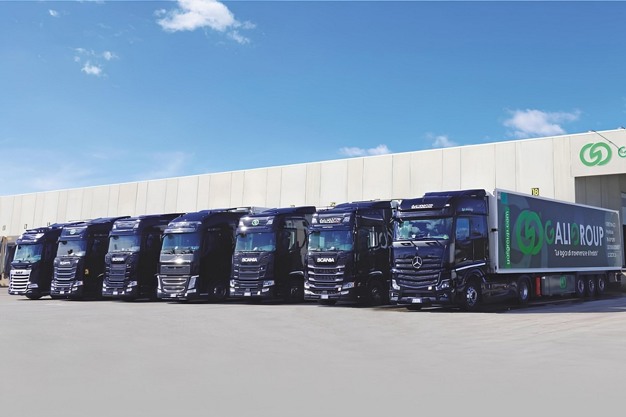Our Terms & Conditions | Our Privacy Policy
Challenges, opportunities and sustainability in the logistics market
In recent years, the logistics of the fruit and vegetable sector have undergone significant changes. These changes have been influenced by two main factors. First, there has been a growing demand for expedited deliveries. Second, there has been a lack of both modernization and integration of rail and maritime shipping. The latter, while offering advantages in terms of sustainability and cost for the transportation of large volumes, have not made significant progress in terms of adequate infrastructure and services to meet the needs of a sector characterized by highly perishable products.
 Angelo Galifi
Angelo Galifi
Angelo Galifi, director of the Gali Group, a transportation company with headquarters in Ispica, Sicily, and a southern Tunisian location, offers insights into the industry.
“Road transport has taken on a significant role, covering about 90% of the logistical operations of the fruit and vegetable sector,” says Galifi. “These data were obtained from an in-depth study of the Italian fruit and vegetable sector carried out by Assotir (a professional association that brings together more than three thousand companies and 18 thousand vehicles). This advantage is mainly due to the ability to offer flexibility, i.e. the ability to handle small and medium loads quickly and to adapt to the customer’s needs. Capillarity also counts for a lot, such as the ability to provide direct access to areas less served by other modes of transportation.”
“Transporting perishable goods from Sicily to northern Italy and Europe,” continues the manager, “presents numerous difficulties. The geographical isolation of the island, aggravated by insufficient sea and rail connections, increases the dependence on road transport, which takes longer and is more expensive. The often inadequate road infrastructure, coupled with the distance from destination markets, makes logistics management complex and increases the risk of product deterioration during transportation. In addition, fluctuating temperatures and the need for strict cold chain monitoring require technologically advanced trucks and trailers, further increasing operating costs.
Germany is the main destination for Italian fruit and vegetable exports, thanks to a strong demand for high-quality fresh products”, says the expert, “followed by Austria, Spain and Poland. These data confirm the strategic importance of Germany as a trading partner, traditionally the main foreign destination for Sicilian fruit and vegetables (source: International Trade Center published by the ‘I Love Fruit & Veg From Europe’ program). In recent years, new emerging markets, such as the Netherlands and Belgium, have shown a growing interest in Sicilian fresh produce, thanks to the increased focus on sustainability and traceability of agricultural production.”

“First the Covid-19 pandemic and then the Ukrainian crisis profoundly changed the international transportation sector, with contrasting consequences,” explains Galifi. “During the pandemic, restrictions and lockdowns resulted in a reduction in overall shipments, but sectors such as fruits and vegetables saw significant growth, with estimated increases of between 15% and 20% for fresh produce, thanks to the rise of the online sales channel and growing awareness of healthy eating habits. This information is provided by ‘The World after Lockdown Observatory’ by Nomisma and CRIF, which analyzed the impact of the Covid-19 pandemic. The Ukrainian crisis, on the other hand, had a more complex impact, increasing operating costs due to fuel inflation and route rerouting, with a decrease in flows to Eastern Europe and an increase in exports to more stable markets such as Germany and France. In summary, the sector has shown remarkable resilience, but with marked differences between segments and destinations,” he says.
“International competition has a significant impact on the transportation of Italian fruit and vegetables,” he continues. “Italian companies face competition not only from European producers but also from non-EU countries such as Morocco, Egypt and Turkey. These countries can offer fruit and vegetable products at lower prices thanks to lower production costs, cheap labor, and favorable transportation policies. In addition, the trade facilitation offered by bilateral agreements between some of these countries and the European Union makes it easier for their goods to enter European markets, thus increasing competitive pressure. For Italy, these dynamics require a greater focus on logistical efficiency to maintain its competitive advantage and ensure the quality of its products.”
“Brexit has also significantly affected the transportation of Italian fruit and vegetables,” says Galifi. “The UK was one of the main destination markets. New trade barriers, customs controls, and health regulations have caused an increase in costs and transit times. In addition, the restructuring of routes and the handling of new customs procedures also affected other European destinations. Companies have had to adapt to a more complex market with increased costs and a greater focus on managing exports to Europe. The change in transport dynamics indirectly affected other destinations such as France and the Netherlands by making the flow of goods between the UK and EU countries more difficult and expensive. The industry has had to adapt quickly, seeking new modes of transportation and logistics solutions to mitigate the impact of the new post-Brexit regulations,” he adds.
“Another increasingly important issue in the fruit and vegetable transportation sector, in addition to those already mentioned, is sustainability,” says the interviewee. To reduce the environmental impact of their logistics operations, companies are increasingly investing in eco-friendly solutions. This includes using green vehicles, the optimization of transport routes to reduce CO2 emissions, and using sustainable packaging. These developments are not only in response to growing consumer demand for green products but also to increasingly stringent European sustainability regulations. At the same time, technological innovation is playing a key role in improving the efficiency of the sector. The use of digital technologies, such as real-time shipment tracking and advanced supply chain management, is helping to reduce transit times and improve the predictability of operations. The adoption of digital platforms for shipment tracking and inventory management allows companies to optimize their resources, reduce operating costs, and ensure greater freshness of fruits and vegetables.”
For more information:
Angelo Galifi
Gali Group srl ![]()
C.da Chiusi s/n
97014 Ispica (RG) – Italy
+39 0932 700111
+39 0932 793094
[email protected]
www.galigroup.com
[ad_1]
Images are for reference only.Images and contents gathered automatic from google or 3rd party sources.All rights on the images and contents are with their legal original owners.
[ad_2]


Comments are closed.